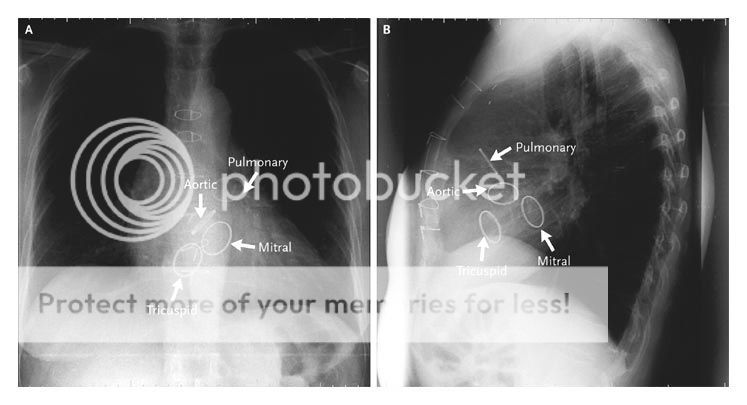Images in Clinical Medicine
Volume 353:712 August 18, 2005 Number 7
Four Artificial Heart Valves

A 67-year-old woman reported having progressive shortness of breath over several months, three years after undergoing aortic-valve replacement for aortic insufficiency. The patient had migraine headaches for which she had received 2 mg of ergotamine tartrate daily for many years. On physical examination, her blood pressure was 170/95 mm Hg. She had elevated jugular venous pressure, and grade 2/6 systolic and diastolic murmurs were noted along the right sternal border. The results of laboratory analysis for 5-hydroxyindoleacetic acid were normal. Echocardiography showed a normal aortic-valve prosthesis and thickened mitral, pulmonary, and tricuspid valves with severe insufficiency. Cardiac catheterization revealed elevated right atrial pressure and normal coronary arteries. On rethoracotomy, all three native valves were found to be severely thickened and were replaced with St. Jude Medical prostheses. The patient had an uneventful recovery, and her symptoms improved from New York Heart Association class IV to class I. A follow-up radiograph of the chest shows the position of all four prosthetic valves (arrows, Panels A and B). Pathological examination showed changes compatible with the long-term use of ergotamine. A review of the pathological report from her initial aortic-valve surgery three years earlier demonstrated findings consistent with ergotamine toxicity as well. The patient continues to do well at one year and uses paracetamol for management of migraine pain.







![Woneligo Smart Watch for Women,Fitness Watch(Answer/Make Call),Alexa Built-in, [24H Heart Rate Sleep Blood Oxygen Monitor],5ATM Waterproof,100 Sports Modes Step Calorie Watches for iOS&Android Phones](https://m.media-amazon.com/images/I/4102RKWBa0L._SL500_.jpg)
















